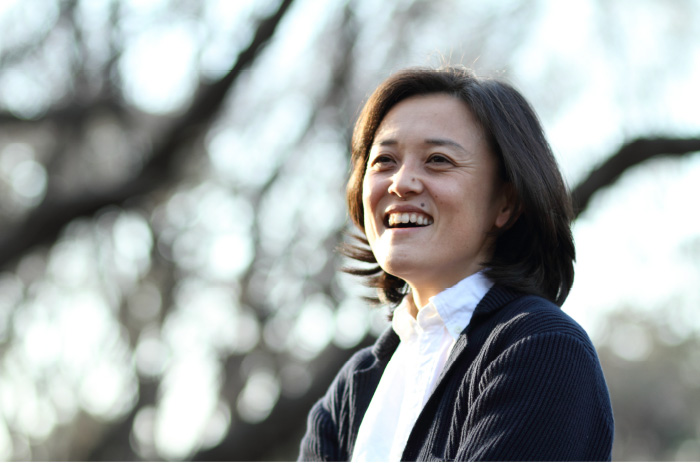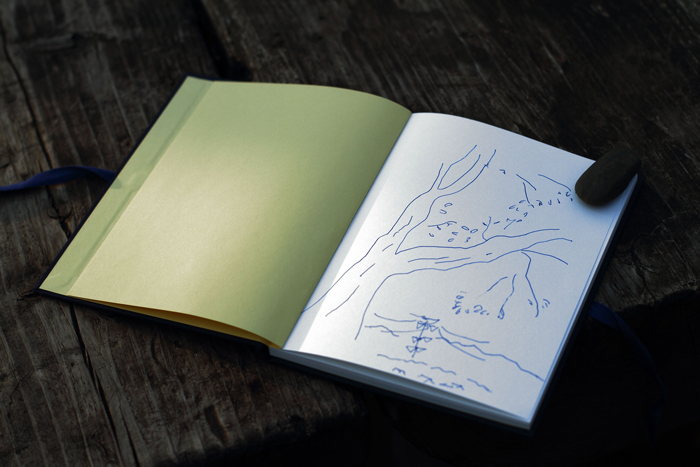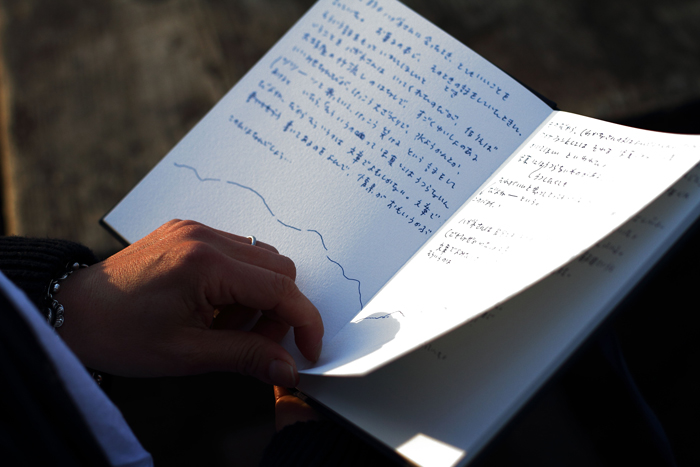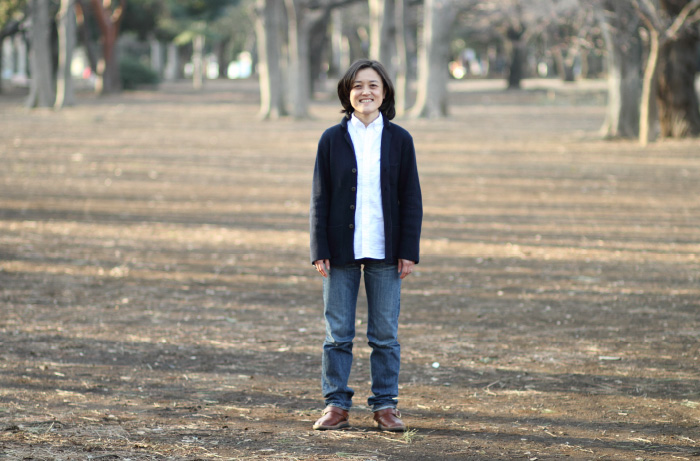若菜晃子さん
山を仕事にするとは思ってもみなかった
書籍や雑誌の編集を手がけることを生業とする若菜晃子さん(以下、若菜さん)。編集だけでなく自ら取材に出かけて執筆することもあれば、最近では本を丸ごと1冊手がけることも増えたという。カテゴリーは特に限定していないが、得意分野は「山」「旅」「自然」。大学卒業後、山と溪谷社に就職したことや、兼ねてから山や自然が好きなことも功を奏して、現在の職業に至る。 元々、本が好きだった若菜さんは、本をつくる仕事に就こうと決めて、山と溪谷社に入社。いまとなっては若菜さんをかたちづくる「山」と「本」という二大要素につながる道のりだが、当時はあくまで「本をつくること」に主眼が置かれていた。 「山と溪谷社に入っていなかったら、山に関係することを仕事にすることはなかったと思います。山のことなんてなにも知りませんでしたから。昔ながらの出版社なので、本のつくり方については非常に厳しくしつけられました。編集という仕事のすべてをここで教わったと思います。とりわけ最初の配属先が植物や樹木、野鳥、魚などの図鑑の編集部だったので、膨大な知識が必要とされるだけでなく、制作に大変な手間と労力がかかりました。編集者はもちろんのこと、著者の先生やカメラマンなど、全員の総力を結集してつくりあげる密度の濃い仕事だったので、『世の中に本を出すということはどういうことなのか』を、身をもって学んだのもこの頃です。山に関しても、取材で日本中の山に登りに行って、その良さを知ることができましたし、私の人生にとって山はなくてはならないものになりました。ヤマケイ(山と溪谷社)での仕事はかけがえのない財産です」と、ご自身の原点を振り返る。 2005年、15年間勤めた同社を退社することを決意。決めるまでに2年ほど悩み続けたという。会社には並々ならぬ愛着もあったし、ご自身のことを保守的だと語る若菜さんにとって、会社という組織を飛び出すことはとても大きな勇気がいったそうだ。 「会社を辞めるとき、ある目上の著者の方に『社会に出て学んだことを、今度は還元していく立場になるのだから頑張りなさい』というアドバイスをいただきました。いままでお世話になった方々にいただいた恩を、これからの仕事のなかで生きているうちに返していかなくてはいけないと、決意したときでもありました」 独立してから今年で8年目。会社を辞めたときに想像していた自分よりも、ずっとやりたいことに近づいてきたことを改めて実感している日々だ。日常のなかでチャネルを変えてみる
若菜さんの日常は自然のリズムと似ている。1〜2月は比較的静かに過ごしているが、春が来ると周囲がうごめき、冬眠から目覚めた熊みたいにむっくりと起き上がって仕事をはじめる。そのまま夏を駆け抜けるように過ごし、9月くらいにぽつんと時間ができたら海外へ旅に出て、そのあとは年末まで慌ただしく働く1年。夏は5時くらいに目が覚めるが、冬は寒さも手伝って8時くらいまで布団のなか。起きたらまずコーヒーを飲んで毎日30分くらい走りに行く。体力づくりも仕事の一環だ。走ったらお腹が空きそうなものだがお昼までは何も食べない。 「出版社時代から徹夜も多くて朝まで働いたりしていたもので、朝ごはんを食べる習慣がありません。でも思い返せば、こどもの頃から食べていなかったのかも。たいてい寝坊気味に起きるので、当然朝ごはんを食べる時間がなくなるわけです。すると両親が『牛乳と生卵だけ飲んでいきなさい』と言って用意してくれるのですが、その組み合わせはこどもには過酷ですよね(苦笑)。とくに冬場はホットミルクになって、表面に張る牛乳の膜がいやで飲まずに出かけると、わたしが飲まなかった牛乳が夜までとってあるのです。『この膜に栄養があるんだ』なんて父に言われるものだから、父の見ていないところでそっと膜だけ捨てたりしていました(笑)」と楽しそうに幼少期を振り返る。 ランニングから帰ったら午前中は仕事をする。昼食はさすがにお腹も空いているのでモリモリと食べて、打ち合わせがあるときは出かけるし、自宅で原稿を書くこともある。 「編集の仕事は幻想を具現化できるようで愉しいけれど、書く仕事は自分がいいと思うことを自由に書けるからそれはそれで面白いです。総じて、このように自分がやりたいことでお仕事をいただけているということがいまだに信じられなくて、神様、ほんとうにありがとう!って心の底から感謝する毎日です」 いいアイディアが思い浮かばなかったり、原稿に行き詰まったりするときには、料理をして違う脳みそを使ってみたり、走りに出かけて無心になってみたりして気分転換をするそうだ。むしろ机に向かっている時間でないときのほうが思考もクリアになり、アイディアが浮かぶと言う。さらに仕事が詰まってきてどうしようもなくなると、無性に山に行きたくなる。大きな山に行くとなればそれなりの日数と計画が必要になるけれど、若菜さんには半日でぱっと行って帰ってくることができるお気に入りの山や丘、公園があるそうだ。ちょっとしたおやつや、お湯を沸かしてお茶が飲めるようなセットを持って出かけて、少しの間だけ自然に身を委ねる。普段の生活のなかで日常と違う世界に入る接点があるのとないのとでは大きく違う。 「半日で充分に満喫できて気持ちのいい散歩コースが都心の近くにも実は数多くあります。たとえば小田急線沿線の『多摩丘陵*1』。高尾山麓から東京都町田市と神奈川県境あたり一体のことを言うのですが、なだらかな丘陵地で雑木林を歩くコースや川もあります。それから玉川学園に『かしのき山自然公園*2』という公園がありまして、1周が15-20分くらいで歩けるくらいにこぢんまりとした公園なのですが、そこもとっても好きな場所です。または大学のキャンパスもおすすめです。東京大学*3や東京農業大学*4の敷地には森が残っていたり、池もある。大学は誰でも入れるからキャンパス内のカフェによく仕事をしに行きます。大学は言わずもがな勉強するところなので、一定のテンションが保たれていて仕事をするのに向いています」 若菜さんのように自然と都心をスマートに行き来することができたら、日常がぐっと自由に感じられることだろう。ある天気のいい日に、つつじの植え込みから出たばかりの新芽がぱあっと光っていることに目を奪われる若菜さん。しかしこれらの自然の声は若菜さんだけに届いているのだろうか。 「こどもの頃から、自然をよく観察しているほうだと思います。わたしが気にかけているというのもありますが、植物はいつもあるがままに光ったり匂いを出したり音を出したりしているわけですから、そう考えるとわたしに限らず、こちらが感覚を開いていれば誰でも自然とコンタクトできると思います。わたし自身も、原稿の締切直前などは自宅でパソコンと一体化していることも多々ありますし、何の植物が芽吹こうと咲こうと気づかないこともありますよ(苦笑)。でもあまり感覚を閉じている時間が長く続くと自然飢餓状態になって、『あぁ、山に行きたい…』とかひとりでつぶやいてることもあります(笑)」 遠方に出かけたり、長い旅に出るのも時にはいいが、自分にとって身近で気軽に取り入れることができる「日常のチャネルを変えるための手立て」があることこそ、毎日をより豊かにする秘訣なのかもしれない。
リアリティをもつことの大切さ
若菜さんにとって「本をつくる」という仕事はどんな意味をもつのだろう。 「価値があると自分が思ったことを誰かに伝えたいから本をつくっているのだと思います。しかし同時に、読み手にとってそれが意味を成すのかどうかも、ものすごく考えます。それはわたし自身が本からたくさんのことを学んできたし、本はひとりの人間に対してそれだけの力をもたらすものだと信じているので、そういう本をつくることができるような仕事を続けたいと思っているからだと思います。ですから誰かひとりでもそれを手にして良い本だと思ってくれたら、それで充分です」 若菜さんにとって、伝えることが目的なのだとしたら「本」という体裁であることにどのくらいの重要度があるのだろうか。 「本であるということは、わたしにとっては非常に重要なことです。本は手元に『存在』として残る。どこかにしまっておいたとしても読みたいときに引っ張り出してきて、繰り返し読むことができますよね。ひとたび本を開けば、そこに独自の世界が広がる。開かなければそこにはなにもないのだけど、開けばそこにあるという。こどもの頃に絵本を開いて高揚したあのときの気持ちから変わらない、この感覚がすごくいいなと思うんですね」 若菜さんのお話を伺っていると、そこに『存在としてある』ということをとても大切になさっているように感じる。 たまたま電車を乗り換えた東急線の二子玉川駅で見かけた夕焼けがあまりにも綺麗だったある日。多摩川に春霞(はるがすみ)がかかったようで、さぞやみんなも見とれていることだろうと思い、若菜さんが周囲を見渡すと、一組をのぞいて誰もその景色を気に留める様子もなかったと言う。でもこういった体験は自分自身が現実として体感しないと、心底納得して自分のものにはできない。若菜さんはこのことを『ウミガメ論』と呼んでいる。これは若菜さんの実体験に基づいたもので、海に潜ったある日、海のなかでウミガメと目があったのだと言う。そのとき突如として、『ウミガメを守ろう』という環境保護活動がリアリティをもって自分ごとになる感覚があったのだ。山の素晴らしさは山に行ってみないとわからないし、植物の良さも自分の目で見なければわからない。たとえ人から見聞きしたり、知識を持ち合わせていたとしても、それを実体験としてもっていなければ自分のものにならないと、若菜さんは語る。 「何を『自分のもの』とするのかは人それぞれだし、人生のなかで取捨選択していくわけですが、こと自然に関して言えば、自然を感じる力は元来人間が本能として持ち合わせている感覚だと思うのです。自然を感じながら暮らすほうが生きやすいし、人生が豊かになる。そこで急に、地球にやさしくとか、自然は素晴らしいとか、とってつけたようなことを言うのではなく、人間の力ではどうにもできない大いなる存在の自然に対して、自分もそのごく小さな一部であるという認識が必要だと思います」 ついつい毎日を忙しくしていると、自分に直接的に関係のないものは「そこにないもの」として生きてしまいがちだが、自然は確かに「そこにある」わけで、それを意識して生きるというその距離感が何につけ大切なのだと感じた。 ご自身が「伝える価値がある」と思うことにはエネルギーを惜しまずにやり遂げたいと語る若菜さんは「いまのわたしは自分が大切だと思うことを世の中に発信できる恵まれた環境にいますから、価値があると思う物事については、自分の伝え方で伝え続けるべきだと思っています。それを生業にしているわけだし、それをせずに漫然と生きていても意味がないと思うのです」と話してくれた。なめらかな語り口で紡がれる言葉のひとつひとつには、強い意志とエネルギーが宿っていた。
 PHOTOGRAPHY BY YUKI HOSHINO
PHOTOGRAPHY BY YUKI HOSHINO
若菜さんの職業ツールであり相棒とも言える「フィールドノート」。ブルフォンセというスケッチブックで、独立を機に同サイズのものを使い続けて10冊目。「たとえば、雉鳩(きじばと)が鳴いていたとか、桜が咲いたとか、沈丁花の香りがしたとか、光が綺麗だったとか、車窓から丹沢が見えたとか…日常のなかで自然について気づいたことを書いておくノートです」。このほかに山行きの一部始終を描く絵日記「山のスケッチブック」は20冊以上。またパーソナルな気づきや考えを書き留めておく、通称「白ヤギノート」には毎年元旦に「3つの誓い」をご主人と一緒に書くのが恒例。
<参考>
*1 多摩丘陵 http://tama.tokyo-park.or.jp/
*2 かしのき山自然公園 http://www.city.machida.tokyo.jp/bunka/park/kashinoki/park10.html
*3 東京大学 http://www.u-tokyo.ac.jp/
*4 東京農業大学 http://www.nodai.ac.jp/
若菜晃子さんの連載コラム > Listen to the Earth
- Guest File #01
- I'm here now because there are mountains Akiko Wakana (Editor)
- MONDAY, 1st APRIL, 2013
I had never dreamed of making mountains my job
Akiko Wakana (Mrs. Wakana below) works on editing magazines and books. She says that she not only edits but has also gone out for material herself and recently made an entire book. She isn't limited to a certain category; her specialties are “mountains,” “travel,” “nature”. After graduating from college, she succeeded in combining her love of nature and mountains with having been hired at Yama-kei Publishers co., Ltd, leading her to her current job. Mrs. Wakana decided to get a job making books because she always loved them, and was hired at Yama-kei Publishers co., Ltd. Now the two key elements of “mountains” and “books” are what made Mrs. Wakana, but at that time she was focused only on “making books.” She reflects on her starting point: “I don't think I would have worked with mountains had I not worked at Yama-Kei Publishers co., Ltd. I didn't know anything about mountains. They were extremely strict with me about making books because they're an old-fashioned company. Everything that I know about my editing job, I learned here. Above all, the company was an editorial office for picture books of fish, wild birds, trees and plants, so I not only needed a vast knowledge, but it also required great care and effort. It was at this time that I learned first-hand what it means to publish a book in the world because it is a job so dense that it not only takes the editors' but also the authors' and photographers'—everyone's collective effort—to make. I went to climb mountains all over Japan and came to understand their greatness, and mountains became an integral part of my life. My work at Yama-kei Publishers co., Ltd. is an invaluable resource.” In 2005, she decided to quit her job at the company after 15 years. She says that she fret over it for two years until she made her decision. For the conservative Mrs. Wakana who had a fierce passion for her company, to break loose from a company organization required great courage. “When I quit the company, my superior author advised me, 'Give it your all because next you'll be in a position to give back everything you learned in society.' It was then, too, that I decided that I had to return the favor in my work while I am alive to all of those who had helped me.” This year it has been 8 years since she went out on her own. Every day she realizes once more that she's closer to doing what she had always wanted to do than she had imagined herself doing when she quit the company.Trying to change the channel of her daily life
Mrs. Wakana's daily life resembles nature's rhythm. She spends January to February relatively quietly, but when spring comes around her surroundings squirm, she gets up heavily like a bear waking up from its hibernation and begins working. She spends her year like this, running through summer, and if she has bit of time around September she goes on a trip overseas. After that she works busily until the end of the year. In the summers she wakes up at about five and in the winters she is still in her futon until 8 due to the cold. Once she gets up she drinks coffee first and then goes running for 30 minutes. Fitness training is a part of her work. Although it seems she would be hungry if she ran, she eats nothing until lunch. “I don't usually eat breakfast because I often worked all night until morning ever since I was in the publishing company. But when I think back on it, I probably haven't eaten breakfast since I was a child. I usually slept in, so I never had time to eat breakfast. So my parents would make me breakfast saying, “At least drink your milk and eat your raw egg.” That combination is cruel for children. [She smiles wryly] Especially during the winter months, I would leave without drinking the hot milk because I didn't like the skin over the surface, but the milk I didn't drink would be left out until night. My father would tell me, 'The skin is nutritious,' but I would quietly throw away the skin when he wasn't looking ,” she laughs, looking back happily on her childhood. When she comes home from running she spends the morning working. At lunch she eats heartily because she's hungry as expected. When she has meetings she goes out. Sometimes she also works on her drafts from home. “Editing is fun because it can embody dreams, but writing itself is interesting because I can freely write what I think is good. In general, every day I thank God from the bottom of my heart because I still can't believe that I can work doing what I like to do like this.” When she doesn't have any good ideas or gets stuck in her writing, she snaps out of it by going out for a run and putting it aside or uses a different part of her brain by cooking. She says that her thoughts are rather clear when she's not facing a desk and ideas come to her. Furthermore, when she gets really stressed because she's stuck in her work, she has the urge to go to the mountains. Since she needs a plan and several days when she goes to a large mountain, Mrs. Wakana goes to her favorite parks and mountains where she can quickly go and come back in half a day. She takes some small snacks and a set to boil hot water to have tea and abandons herself in nature for a little while. There's a big difference between having an interface and not having an interface to a world different from her daily life in her every day life. “There are actually many pleasant walking courses you can thoroughly enjoy in half a day near the heart of the city. For example, Tama Kyuuryou*1 on the Odakyu line. They say that from Mount Takao to Machida, Tokyo and around the Kanagawa border is one, but there are also rivers and and courses where you can walk through untouched forests and easy hills. Then in Tamagawagakuen there's the Kashinoki Natural Park*2, which is a cozy park that you can walk all around in 15-20 minutes. I love it there very much. I also recommend University campuses. The lakes and forests of Tokyo University*3 and the Tokyo University of Agriculture*4 still remain on their campuses. Anyone can go on campus grounds, so I often go to work in their cafes. They're perfect for doing work because you can maintain a level of motivation since universities are, as you know, places of study. If you can come and go gracefully through the heart of the city and nature like Mrs. Wakana, you can feel more free in your daily life. Mrs. Wakana is enchanted by the strong shining of the new buds that have just come out from the azaleas shrubbery on a fine day. However, can only Mrs. Wakana hear these voices of nature? “I think I've always been the type to observe nature since I was a child. Of course, I'm concerned about nature, but if they open their senses, plants are always shining, giving off scents, emitting sounds as they are, so I think it's not only me when viewed in this light—others can have contact with nature. There are many times that I myself am one with my computer at home right before a draft is due, so I sometimes don't realize what buds plants are putting forth or growing [she smiles wryly]. But when I have too long of periods with my senses closed off, I become nature-starved and sometimes whisper to myself, “Ah, I want to go to Kashinoki Mountain” [she laughs]. It's sometimes good to go on long vacations and to go far away, but the secret to enriching your every day is that there are 'ways to change the channel of your daily life' that you can easily get nearby for yourself.Cherishing the reality that we have
What does the job of “making books” mean for Mrs. Wakana? “I think I make books so I can tell someone about what I think is valuable. However simultaneously, I think a lot about whether that makes sense to the readers or not. I think I've myself have learned lots from books, and I believe that books are something that give one person a power, so I want to continue to work to be able to make those types of books. So it's enough if even only one person reads them and thinks, 'This is a good book'.” If telling is the purpose for Mrs. Wakana, how important is the presentability of 'books'? “It's extremely important to me that they're books. They remain as an “entity” at one's fingertips. Even if you shut them away somewhere, you can pull them out when you want to read them, and re-read them. Once you open books, they take you there to a unique world. They won't take you there if you don't open them, but they will if you do. I think this feeling, the unchanging elevated feeling of opening a picture book when I was a child, is amazing.” Listening to Mrs. Wakana's conversation, we feel that she cherishes that they're “there as an entity”. On a certain day the sunset that she saw at the Tokyu Line in the Futako-Tamagawa station where she sometimes changed trains was very beautiful. The Harugasumi building seemed to have gotten caught in Tamagawa and she thought that everyone was absorbed in it, but when she looked around her, no one seemed to take notice of the scene except for a couple. But unless you experience these experiences as reality for yourself and accept them with all your heart, you cannot make them your own. Mrs. Wakana calls this “The Marine Turtle Theory”. This is based on Mrs. Wakana's real experience. One day when she dove in the ocean, her eyes met those of a marine turtle. She suddenly felt a personal sensation that her conservatism to “protect marine turtles” had begun. You cannot understand the magnificence of mountains without going to mountains and you cannot understand the greatness of plants if you don't see them with your own eyes. Even if you hear about them from others or are given knowledge about them, Ms. Wakana says that they will not be yours unless you experience them for real. “What we 'make our own' varies from person to person and you have to make choices in your life. When it comes to nature, I think that the power to feel nature is a sense that primitive man possesses as instinct. It's easier to live while feeling nature, and life becomes richer. So it's not to suddenly say some exaggerated thing like nature is magnificent or be nice to the earth, but that I think that a consciousness that we are a very small part towards nature whose great existence human power can do nothing about is important.” When we find ourselves busy, we tend to live as if the things that aren't directly connected to ourselves are “not there”. Nature is surely “there”. We feel the sense of distance of living conscious of it is important just like anything else. Mrs. Wakana says she pushes through without spending any energy on thinking that she 'has any telling value'. “I think that I should keep on telling about things that I think are valuable in my own way because I'm in a blessed environment where I can transmit to the world what I currently think is important. I'm making a living doing that, and I think that I'd have no meaning even if I lived freely without it,” she says. In every word spun in an elegant narrative, there lies a strong will and energy. Mrs. Wakana's “field notes” are her career tools and, one could even say, her buddies. They're in a “Bleu Fonce” sketchbook, and with her going out on her own, she has continued to use the same size one. She is on her 10th sketchbook. “They're notes where I write what I've noticed about nature in my daily life... for example, that I saw Tanazawa [National Park] from the window of the car, that the light was beautiful, that I could smell the fragrant daphnes, that the cherry blossoms bloomed, that the turtledove was chirping.” She also has over 20 “Mountain Sketchbook” journals where she draws whole portions of her going to mountains. She also has what she affectionately calls “the White Goat Notes” where she writes her personal ponderings and observations—and, in which, on the first of every year, it is usual practice for her to write “three oaths” with her husband.
<References>
*1 Tama Kyuuryou http://tama.tokyo-park.or.jp/
*2 Kashinoki Natural Park http://www.nodai.ac.jp/map/setagaya/index.html
*3 Tokyo University http://www.u-tokyo.ac.jp/
*4 Tokyo University of Agriculture http://www.nodai.ac.jp/
Mrs. Akiko Wakana's Serial Column > Listen to the Earth









